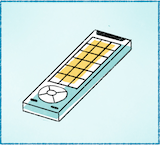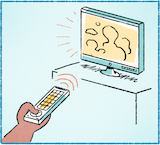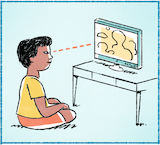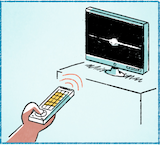




นี้คืออี่หยัง อันนี้คือโทละทัด อันนี้เป็นโทละทัด โทละทัดจอแบน โทละทัดเคี่ยงบักใหญ่หนึ่ง ใหญ่กะด้อกะเดี้ย
ปะโยดของโทละทัดกะมีหลายสิ่งหลายอย่างอยู่ เอาไว้ถ้าเบิ่งข่าว ไว้ถ้าเบิ่งกาตูน ไว้ถ้าเบิ่งอันนั้นอันนี้ได้หลายสิ่งหลายอย่าง
โทละทัดมันลาคาแพงบ่ กะแพงอยู่ แพงหลาย แพงคัก ขั้นบ่มีเงินกะซื้อบ่ได้ เพาะว่ามันแพงหลาย
17
นี้คืออี่หยัง อันนี้เป็นลีโหมด อาดสิเป็นลีโหมดโทละทัดกะได้
ลีโหมดเป็นแบบใด ลีโหมดกะเป็นสี่เหลี่ยม อันน้อยๆ เอาไว้ถ้ากด กดเกี่ยวกับโทละทัด หลือว่าใซ้งานคู่กับโทละทัด
ลีโหมดกะอาดสิเอาไว้ถ้าเลี้ยนซ้อง หลือว่ากดไปซ้องนั้นซ้องนี้ หลือว่าเพิ้มเสียงลดเสียง หลือว่าใซ้ไว้ตั้งค้าอันนั้นอันนี้กะได้
18
เขากำลังเฮ็ดหญัง เขากำลังเปิดโทละทัด เขาใซ้มือของเขากดลีโหมด เพื่อว่าเปิดโทละทัด เขาอาดสิอยากเบิ่งโทละทัด เขาเลยสิเปิดโทละทัดนี้
แล้วเขาอยู่ไกโทละทัดบ่ เขาใซ้ลีโหมดกดเปิดโทละทัดอยู่ไกโทละทัดคักบ่ บ่ บ่ไกหลาย ขั้นลีโหมดกับโทละทัดอยู่ไกกันหลาย สันญานมันกะสิบ่ฮอดกัน กะสิบ่เซี้ยมต่อกัน เพาะสะนั้นแล้ว ลีโหมดกับโทละทัดกะสิอยู่ใก้ๆ กัน
19
เขากำลังเฮ็ดหญัง เขากำลังเบิ่งโทละทัด
พุซายคนนี้เขากำลังเบิ่งโทละทัด กำลังจ้องเบิ่งโทละทัด กำลังแนมเบิ่งโทละทัด
เขาอยู่กับใผ เขาอยู่พุเดียว เขาเบิ่งของเขาพุเดียวข้อหล้อ บ่มีฮอดหมู่ อยู่พุเดียวอ้อยต้อย
20
เขากำลังเฮ็ดหญัง เขากำลังปิดโทละทัด
เขาปิดโทละทัดเฮ็ดหญัง เขาอาดสิบ่เบิ่งโทละทัดนี้แล้ว เขากะเลยปิดโทละทัดกะได้
เขาปิดโทละทัดจั่งใด เขาใซ้ลีโหมด หลือว่าใซ้มือของเขากดลีโหมด เพื่อว่าสิปิดโทละทัด
เป็นหญังเขาต้องปิดโทละทัดญ้อนลีโหมด เพาะว่าลีโหมดหนะมันมีปุ่มกดปิดโทละทัด หลือว่าปุ่มกดเปิดโทละทัด
แต่ว่าขั้นเฮาบ่อยากกดลีโหมดนี้ เฮากะไปปิดอยู่หม้องโทละทัดกะได้ อยู่โทละทัดมันกะสิมีปุ่มเปิดหลือว่าปุ่มปิดโทละทัดอยู่ เฮากะสามาดไปปิดหลือไปเปิดอยู่หม้องโทละทัดกะได้ แต่ว่าขั้นเฮาบ่อยากญ่างไปโทละทัด เฮากะจับลีโหมดนี้ แล้วกะปิดหลือว่าเปิดโทละทัดกะได้
Link to overview page
Link to dictionary
| Isaan | Pronunciation | Tones | Thai | English/Notes |
|---|---|---|---|---|
| นี้ | ni: | HF | นี้ | 1. this 2. here |
| คือ | khʉ: | HR | คือ | 1. to be, to resemble, like, as 2. why {บักหล้าคือบ่เก็บโต่ะแน่ = [addressing a young boy] Why haven't you cleared the table?} |
| อี่หยัง | i:-yaŋ | H-M | อะไร | 1. what {นี้คืออี่หยัง = What is this?} {มื้อนี้เจ้าเฮ็ดอี่หยัง = What are you doing today?} {กินเข้างายกับอี่หยัง = What did you have for breakfast?} 2. something, anything, (in negations) nothing {บ่ต้องเฮ็ดอี่หยังอีกเลยนอกจากใส่ปุย = [we] don't need to do anything besides adding fertilizer} |
| อัน | an | M | อัน | 1. thing, object 2. general clf. for objects |
| โทละทัด | tho-la-that | HR-H-H | โทรทัศน์ | TV Notes: pronunciation: also realized as โทระทัด |
| เป็น | pen | M | เป็น | 1. to be, to exist 2. to be able to 3. to suffer, sth. happens to 4. เป็นหญัง[...]คือ in initial position: why? {เป็นหญังเขากะคือแปงฟัน = Why is he brushing his teeth?} {เป็นหญังเคี่ยงบินมันคือสิตก = Why is the airplane falling down?} |
| จอ | jɔ: | M | จอ | screen |
| แบน | bɛ:n | M | แบน | flat |
| เคี่ยง | khi:aŋ | H | เครื่อง | 1. machine, engine 2. clf. for machines, airplanes, electronic devices etc. Notes: pronunciation: also realized as เคื่อง |
| บัก | bak | M | 1. intensifier before adjectives {ปาโตบักใหญ่ = a (very) large fish} 2. prefix in front of fruits and vegetables {บักแตงโม = watermelon} 3. can be used as a reference for a male person of the same or younger age {บักอันนี้ = this lad} |
|
| ใหญ่ | ɲai | H | ใหญ่ | large, big |
| หนึ่ง | nʉŋ | H | หนึ่ง | 1. one 2. after adjective: intensifier {บักคักหนึ่ง = very much} {อันบักใหญ่หนึ่ง = very large}, or attenuates the meaning {กะดาดมันแผ่นน้อยๆ หนึ่ง = the piece of paper is [relatively] small} |
| กะด้อกะเดี้ย | ga-dɔ:k-ga-di:a | M-HF-M-HF | มากมาย, มากเกินไป | intensifier: very, very much |
| ปะโยด | pa-yo:t | M-LF | ประโยชน์ | 1. benefit 2. useful |
| ของ | khɔ:ŋ | M | ของ | of, belonging to |
| กะ | ga | M | ก็ | 1. then, consequently 2. also |
| มี | mi: | HR | มี | 1. to have 2. there is |
| หลายสิ่งหลายอย่าง | la:i-siŋ-la:i-ya:ŋ | M-H-M-H | หลากหลาย, มากมาย, หลายอย่าง | varied, various, several (kinds etc.) |
| อยู่ | yu: | H | อยู่ | 1. to be (located) at 2. yet, still 3. auxiliary indicating continuous or progressive action {ทอดปาอยู่ในกะทะ = (in the process of) frying a fish in the pan} {แม่กำลังเมี้ยนเฮียนอยู่ = mother is cleaning/tidying up the house} |
| เอา | ao | M | เอา | to take, to give {เขากำลังเอาก่องไปซั่ง = he's taking the boxes to weigh them} {หมอกำลังเอายาให้คนป่วยกิน = the doctor is giving medicine to the patient} {เอาไว้ถ้า = is for, is used for, has the purpose of} |
| ไว้ถ้า | wai-tha: | HF-LF | usually in a positive statement or answer: is for, is used for, has the purpose of {กะทะมีไว้ถ้าทอด = a pan is for frying} {น้ำบักนาวมีไว้ถ้าปุงอาหาน = lime juice is used to season food} {ปากกามีไว้ถ้าเขียน = a pen is for writing} {กะเทียมเอาไว้ถ้าเฮ็ดแนวกิน = garlic is used to make food} {ขาเอาไว้ถ้าญ่าง = legs are for walking} {เกิบเอาไว้ถ้าใส่ = shoes are for wearing} Notes: see also ไว้ |
|
| เบิ่ง | bəŋ | H | ดู | 1. to look at, to see, to watch {เบิ่งโทละทัด = to watch TV} {เบิ่งหนัง = to watch a movie} 2. to guess {เบิ่งซงแล้ว ... = [I] guess / from what it looks like ...} |
| ข่าว | kha:o | H | ข่าว | news |
| กาตูน | ga:-tu:n | M-M | การ์ตูน | cartoon |
| นั้น | nan | HF | นั้น | that, there |
| ได้ | dai | HF | ได้ | 1. can 2. to get, to obtain 3. before verb: indicating past tense 4. บ่ได้ + verb: not |
| มัน | man | HR | มัน | it (also used to refer to people) |
| ลาคา | la:-kha: | HR-HR | ราคา | price |
| แพง | phɛ:ŋ | HR | แพง | 1. expensive 2. dear |
| บ่ | bɔ: | H | ไม่ | 1. no, not 2. question particle, transforming a statement into a question Notes: spelling exception in line with common usage on social media |
| หลาย | la:i | M | เยอะ, มาก | many, much, very |
| คัก | khak | H | intensifier: very, very much | |
| ขั้น | khan | LF | เมื่อ | when, if |
| เงิน | ŋən | HR | เงิน | money |
| ซื้อ | sʉ: | HF | ซื้อ | to buy |
| เพาะว่า | phɔ-wa: | H-H | เพราะว่า | because |
| ลีโหมด | li:-mo:t | HR-LF | รีโมท | remote control (of A/C, TV etc.) |
| อาด | a:t | LF | อาจ | 1. might, may, will 2. likely |
| สิ | si | M | จะ | future tense auxiliary {เขากำลังสิตื่น = he's about to wake up} {สิไปตะหลาด = [I'm] going to the market} |
| แบบ | bɛ:p | LF | แบบ | 1. example, model, kind 2. style, form, pattern, design |
| ใด | dai | M | ใด | 1. which, that one which, what, how {เขานั่งแบบใด เขานั่งขดตะหมาดอยู่ = How is he sitting? He's sitting cross-legged.} {ตอนใด = when?} 2. whichever, whoever {หม้องใดหม้องหนึ่ง = some place, somewhere} {ขั้นเฮาอยากตื่นญามใด เฮากะตั้งเวลาปุกญามนั้น = If we want to get up at a certain time, we set the alarm to that time} Notes: sentence-final often with a marked rising tone |
| สี่เหลี่ยม | si:-li:am | H-H | สี่เหลี่ยม | rectangle, square |
| น้อย | nɔ:i | HF | น้อย | 1. few, little 2. small |
| กด | got | M | กด | 1. to push, to press (down) {กดปุ่ม = to push a button} 2. to withdraw [money] {กดเงิน = to withdraw money} |
| เกี่ยวกับ | gi:ao-gap | H-M | เกี่ยวกับ | about, regarding, pertaining to |
| หลือ | lʉ: | M | หรือ | or |
| ว่า | wa: | H | ว่า | 1. that, as {คำว่า X = the word X} 2. to say |
| ใซ้งาน | sai-ŋa:n | HF-HR | ใช้งาน | to use, to put to use |
| คู่ | khu: | H | คู่ | 1. pair, couple 2. to be paired with |
| กับ | gap | M | กับ | 1. and {ลุงกับป้า = uncle and aunt} {กวยเตียวหมูกับกวยเตียวไก่ = noodle soup with pork and noodle soup with chicken} 2. with, to {ค้ายๆ กับคำว่า ... = similar to the word ...} 3. prefix in front of foods {กับเข้า = side dishes eaten with rice} {เขากินกับกวยเตียว = he's eating noodle soup} |
| เลี้ยน | li:an | HF | เลื่อน | to change, to switch (TV channels) Notes: translation to be confirmed |
| ซ้อง | sɔ:ŋ | HF | ช่อง | 1. opening, slot 2. train cabin 3. TV channel 4. clf. for window panes |
| ไป | pai | M | ไป | 1. to go 2. auxiliary indicating action extending into the future |
| เพิ้ม | phə:m | HF | เพิ่ม | 1. to add, to increase 2. plus |
| เสียง | si:aŋ | M | เสียง | 1. sound, noise 2. tone, voice |
| ลด | lot | H | ลด | to reduce, to lower, to decrease |
| ใซ้ | sai | HF | ใช้ | to use |
| ไว้ | wai | HF | ไว้ | 1. to keep, to put, to place, to retain, to save, to reserve {เขาเอาหัวของเขาไว้ใส = Where does she put her head?} {หมาสิเลี้ยงไว้บ้าน = dogs are kept/raised in the house} {ไก่เลี้ยงไว้ในคอก = chicken are kept/raised in a coop} {หน้ามันบังไว้ = the face is covered/not visible} {เขาเอาโทละสับวางไว้หู = he holds the phone to his ear} 2. for {นาลิกาปุกมีไว้เฮ็ดหญัง = What is an alarm clock for?} {หม้อเอาไว้เฮ็ดแนวกิน = a pot is used to make food} {ก่องเอาไว้เฮ็ดหญัง ก่องเอาไว้ใส่ของ = What is the box for? It's for putting in stuff.} Notes: see also ไว้ถ้า |
| ตั้งค้า | taŋ-kha: | HF-HF | ตั้งค่า | to set (e.g., in the settings menu of a device) |
| เขา | khao | M | เขา | personal pronoun: he, she |
| กำลัง | gam-laŋ | M-HR | กำลัง | auxiliary indicating continuous or progressive action |
| เฮ็ด | het | H | ทำ | to do, to make |
| หญัง | ɲaŋ | M | อะไร, เป็นหญัง = ทำไม | 1. what {เขากำลังเฮ็ดหญัง = What is he doing?} {ธูปเอาไว้เฮ็ดหญัง = What are incense sticks for?} 2. something, anything, (nothing) 3. เป็นหญัง[...]คือ in initial position: why {เป็นหญังเขาคือใส่บักพิกลงไปในกวยเตียว = Why is he putting chili in [his] noodle soup?} {เป็นหญังหน้าต่างมันคือเปิด = Why is the window open?} {เป็นหญังมันคือมีควนไฟ = Why is there smoke?} |
| เปิด | pə:t | M | เปิด | 1. to open {เปิดหน้าต่าง = to open the window} {เปิดปะตู = to open the door} 2. to start, to switch on {เปิดไฟ = to switch on the light} {เปิดแอ = to switch on the A/C} |
| มือ | mʉ: | HR | มือ | 1. hand 2. front leg/paw (e.g., of a cat) |
| เพื่อ | phʉ:a | H | เพื่อ | for Notes: the vowel เอือ is likely to be a Thai loan; pronunciation: also realized as เพี่ย |
| อยาก | ya:k | LF | อยาก | to want, to wish |
| เลย | lə:i | HR | เลย | 1. futher on, beyond, past {เข็มน้อยเลยเลขสิบสองไป = the minute hand has passed number twelve} 2. too much 3. at all 4. definitively 5. completely, utterly |
| แล้ว | lɛ:o | HF | แล้ว | 1. finished 2. already 3. and then, and next (especially แล้วกะ) 4. auxiliary for past tense |
| ไก | gai | M | ไกล | far, distant |
| กัน | gan | M | กัน | mutual, each other, with another, together {เขากำลังนั่งเว้ากัน = they're sitting and talking} {เขาสองคนฮักกัน = they love each other} {ปาสองโตนี้ ใหญ่ห่างกันหลายบ่ = These two fish here, are they very different in size (from each other)?} {ต่างกัน = to be different (from each other)} {ก่องอันไหนหนักกว่ากัน = Which box is heavier (than the other(s))?} |
| สันญาน | san-ɲa:n | M-HR | สัญญาณ | signal |
| ฮอด | hɔ:t | HF | ถึง | 1. to arrive, to attain {ฮอดจุดหมายปายทาง = (airplane, train etc.) to arrive at one's destination} {มันทันได้ฮอดหกโมงอยู่ = it's not yet 6 o'clock} 2. to, at {ผมญาวฮอดบ่าไหล่เอาโลด = long hair down to the shoulders} 3. about {บ่ได้เว้าฮอด = [I] haven't talked about [this]} {คนที่เฮาเว้าฮอดวั่งหั้นหละ = the person we've just talked about} |
| เซี้ยม | si:am | HF | เชื่อม | to connect, to join Notes: pronunciation: also realized as เชื้อม (HF) |
| ต่อ | tɔ: | H | ต่อ | 1. next 2. to join, to connect, to link Notes: see also ต่อไป, ต่อไปนี้ |
| เพาะสะนั้นแล้ว | phɔ-sa-nan-lɛ:o | H-M-HF-HF | เพราะฉะนั้นแล้ว | therefore, for that reason, consequently Notes: pronunciation: also realized as เพาะฉะนั้น |
| ใก้ | gai | HF | ใกล้ | near, close |
| พุซาย | phu-sa:i | H-HR | ผู้ชาย | man, male |
| คน | khon | HR | คน | person, people |
| จ้อง | jɔŋ | HF | จ้อง | to look at, to stare |
| แนมเบิ่ง | nɛ:m-bəŋ | HR-H | มองดู | 1. to look at 2. to watch |
| ใผ | phai | M | ใคร | 1. who {พุซายคนนี้เป็นใผ = Who's this boy?} 2. somebody, someone, anybody, with negative: nobody {บ่มีใผอยู่หนี้จักคนเลย = there's not a single person here} |
| พุเดียว | phu-di:ao | H-M | คนเดียว | 1. alone, by oneself {เขากำลังยืนอยู่พุเดียว = she's standing by herself} {เขานั่งอยู่พุเดียว = he's sitting by himself} 2. one person |
| ข้อหล้อ | khɔ:-lɔ: | LF-LF | เท่านั้น, ขนาดนั้น, น้อยๆ | only {ต้นไม้มีต้นเดียว ต้นเดียวข้อหล้อ = there's one tree, only one tree} {มีบ้านหลังเดียวข้อหล้อ = there's only one house} |
| หมู่ | mu: | H | หมู่, กลุ่ม(เพื่อน) | 1. group, friend(s) 2. children (in a family) {ลูกคนที่ออกมาก่อนหมู่ = the first-born child} {น้องสุดหมู่ = last-born child} 3. collective noun: group, many |
| อ้อยต้อย | ɔ:i-tɔ:i | HF-HF | สิ่งเดียว, ไม่มีอะไรด้วยเลย | by oneself, alone {อยู่พุเดียวอ้อยต้อย = to be alone/by oneself} |
| ปิด | pit | M | ปิด | 1. to close {ปิดปะตู = to close the door} {ปิดก่อกน้ำ = to close the tap} 2. to finish, to switch off {ปิดไฟ = to switch off the light} {ปิดวิทะยุ = to switch off the radio} |
| จั่งใด | jaŋ-dai | H-M | ยังไง, แบบไหน | how, in what manner {บักนาวมันมีลดซาดจั่งใด = Lime fruits have what kind of taste?} {เขาปิดแอจั่งใด = How is he switching off the A/C?} {เทียนใซ้จั่งใด = How's a candle used?} {สิใซ้จั่งใด = how is [it] used?} |
| ต้อง | tɔŋ | HF | ต้อง | to have to, must |
| ญ้อน | ɲɔ:n | HF | เพราะ | 1. with the aid of {เขาปิดโทละทัดญ้อนลีโหมด = he uses the remote to switch off the TV} {เขาแปงฟันญ้อนยาสีฟัน = he brushes his teeth with/using toothpaste} 2. because, because of {เป็นหญังมันคือสิละลาย กะญ้อนว่ามันฮ้อน = Why is [the ice cream] melting? Because it's hot!} |
| หนะ | na | M | final particle | |
| ปุ่ม | pum | H | ปุ่ม | button |
| แต่ว่า | tɛ:-wa: | H-H | แต่ว่า | 1. but 2. only {ฮู้แต่ว่าเขายืนอยู่พุเดียว = I only know that he's standing there by himself} |
| เฮา | hao | HR | เรา | 1. personal pronoun: we 2. personal pronoun: I |
| หม้อง | mɔŋ | LF | ที่, แห่ง, บริเวณ | 1. place, area {หลายที่หลายหม้อง = in many places} {หม้องใดหม้องหนึ่ง = some place} 2. clf. for places |
| สามาด | sa:-ma:t | M-HF | สามารถ | can, to be able |
| ญ่าง | ɲa:ŋ | H | เดิน | to walk {เขากำลังญ่างเว้ากัน = they are walking and talking} {ลูกเป็ดญ่างไปนำแม่เป็ด = the ducklings are [walking] following their mother} {เขากำลังญ่างข้ามสะพาน = she's walking over the bridge} {เขาสิญ่างไปใส = Where is he going?} |
| จับ | jap | M | จับ | 1. to grasp, to hold {เขาจับมือกัน = they're holding hands} {เขายืนจับไอติมอยู่ = she's standing, holding an ice cream} 2. to catch, to arrest {จับพุล้าย = to arrest a criminal} |